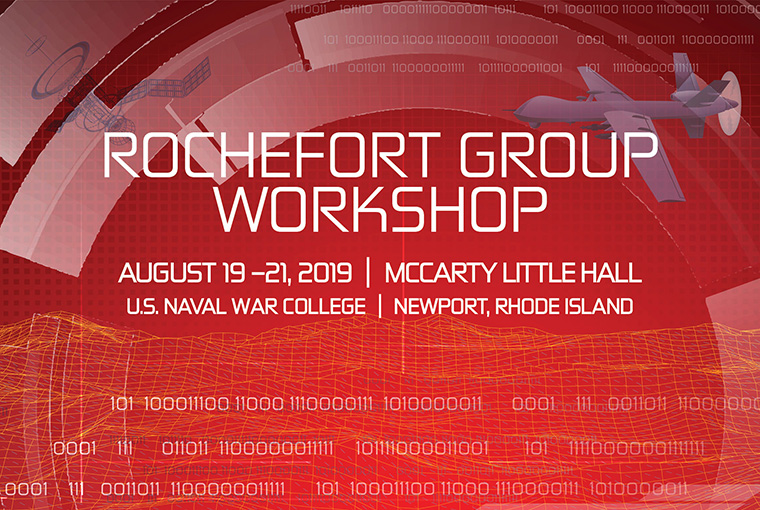Rochefort Group Holds Workshop Looking at “Fires” in Information Warfare

NEWPORT, R.I. – In conventional warfare, the phrase “fires integration” refers to coordination among warships, aircraft and ground units when firing weapons on a target.
In the new information warfare landscape – where nonlethal tactics can have an enormous impact – the term takes on added meaning.
U.S. Naval War College’s Rochefort Group held its second workshop Aug. 19 to 21 with a focus on the concept of “fires” in information warfare.
More than 35 officers from U.S. information warfare commands, Navy numbered fleets and staff judge advocate offices gathered to discuss the questions and challenges that they are facing regularly. Retired Navy Adm. Scott Swift, now a fellow at MIT’s Center for International Studies, served as the senior facilitator.
The three-day workshop was structured around examining three fictional scenarios that reflected current-day challenges in the Middle East, Europe and the Indo-Pacific region. The group broke into teams to work through the scenarios and deliver their findings.
Additionally, the workshop included remarks from flag officers who are leaders in information warfare. They included Vice Adm. Brian Brown, commander of Naval Information Forces; Rear Adm. Jeff Scheidt, commander of Naval Information Warfighting Development Center; and Rear Adm. Michael Brookes, director of intelligence at U.S. Strategic Command.
Capt. Susan McGarvey, director of national security law in the Navy Judge Advocate General’s office, was also a guest speaker.
Now 1 year old, the Rochefort Group was founded at the Naval War College to be a resource on today’s warfighting challenges for the Navy’s information warfare community. It consists of 36 adjunct faculty members coordinated by a core group of five Naval War College professors.
Cmdr. Matthew Griffin, Rochefort director, and associate professor John Griffin, deputy director, discussed the goals and results of the recent workshop.
Q: What was addressed in the Rochefort Group’s second workshop?
Matt Griffin: Fires integration – what that means from an information warfare perspective is mostly nonlethal effects.
Nonlethal could mean a lot of different things. It could mean cyber, it could mean electronic warfare, it could be messaging. The effect might not be something being destroyed, but it could be disrupted or delayed.
The “fires” process is very mature, and it’s work we do really well. But it’s taking the nonlethal side of things and getting it into that known process, so that it becomes more efficient and people get better at it.
John Griffin: When you consider the environment we are in, the great-power competition that’s going on right now, on a daily basis the commanders need more resources and tools to achieve the effects that they desire that can’t be provided by lethal fires.
Q: What was accomplished over the three days, and what are the takeaways?
Matt Griffin: We are still putting together all the data we collected, but what we hope to get out of it is actionable items that information warfare stakeholders can use to improve the community. We are trying to give them things that they can actually work on, so that it’s not such a big problem that they don’t know where to begin. Actions like, maybe there’s a gap in training, or there’s a gap in capability. Or there’s something that the community is wrestling with that this group found, and we can give it to stakeholders to address.
John Griffin: One of the great benefits is it’s an opportunity to bring folks in the information warfare community together from across the globe to exchange ideas and learn from one another. The information warfare community is relatively new, and there are a number of disciplines involved. We create time and space for them to learn what’s going on in different fleets and how they are approaching similar problems.
Q: How does this fit into the larger world picture?
Matt Griffin: Our naval forces are going to be operating in an environment where they need the advantage. What we are trying to do is examine information warfare in a way that gives the fleet the advantage in great-power competition.
John Griffin: I think it’s the emphasis on right now. We’re not projecting “What’s the future of water shortage across the globe in 2040?” The people who left our group yesterday went back to their crisis action planning teams today to work on real-world problems.
Q: What’s next on the horizon for the Rochefort Group?
John Griffin: There’s deep interest already in hosting workshops 3 to 4 and maybe as far out as 10. So the community sees the value in these workshops, and we already have a list of suggestions for future topics that can help them now. But the Rochefort Group does more than workshops; they are just touchstones along the journey. We help and inform the community as best we can.
Matt Griffin: We teach in the curriculum here at the Naval War College, and we do visits to fleets. We are going to meet with two fleet commanders next week and a strike group commander this week, that’s another opportunity for us to talk about information warfare and to gain their perspective.
John Griffin: As another example, we learned all of these things over the past few days, and tomorrow we are meeting with a student writing a research paper. We are going to help him think about his topics. So it is teaching electives, and it’s our interaction across the campus.
